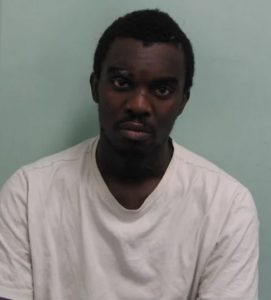A Nigerian drug dealer has today been jailed for 40 years for murdering a mother of nine and her nephew in north London in September 2016.
Prosecutors said Obinna had crept into Mrs Ekofo’s home just after dawn with intent to kill a target of gang revenge.
On hearing the intruder’s noise, Bervil, a student and nephew staying with Mrs Ekofo at the time, went to check and was shot at close
Mrs Ekofo also went to investigate the noise and Obinna pulled the trigger for a second time, a court in the Old Bailey, London, heard.
The victims were a Congolese family and both of them were not the intended targets of the violence. Earlier proceedings had established an existing feud between Obinna and Ryan Efey, one of Mrs Ekofo’s sons.
Prosecution’s evidence included a CCTV footage of Obinna’s car to and from the scene, a gun case discovered under his bed, and gunshot residue.

The car was discovered to have been bought and registered by Obinna using a fake name. Obinna claimed the gunshot residue came from a different shooting when others had used the vehicle.
Obinna’s lawyer said the case was “not proven.”
‘My son is innocent’
Ahead of today’s sentencing, Obinna’s father, Mr Chiedozie Ezeoke had asked the Nigerian government to intervene and save his “innocent” son who would be sentenced October 1, 2020.
In a message sent to the Nigerians in Diaspora Commission, NIDCOM, and the ministry of justice, Mr. Ezeoke said UK authorities hadn’t given his son a fair trial.
“It is with an absolute sense of trust in our country that I make this appeal to your commission. I am putting up this letter to request your urgent intervention on this matter. My son was tried five times which is unprecedented in English and Wales legal history. Justice William Davis allowed for the fifth trial, and differed reasons for that, until the conclusion of the trial, which was strange.”
He pointed out that throughout the five trials, his son maintained innocence.
“On the trial, all pieces of evidence against my son are all circumstantial and the police and the prosecution cannot justify British taxpayers’ funds expended without conviction hence they insisted on an unjustifiable conviction,” Mr Ezeoke said.
range.